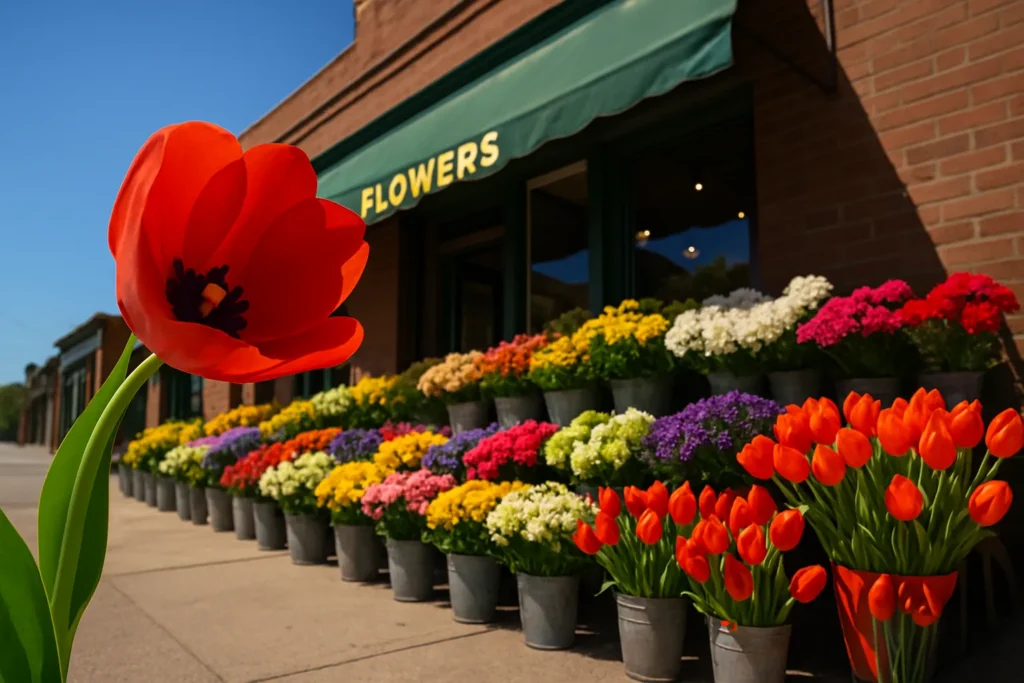ROSEBRIDGE, VT— In what local officials are already labeling “the Tulip Turning Point,” a sudden, coordinated expansion of neighborhood flower shops has upended weekend planning, municipal budgeting, and—if one state senator is to be believed—the very architecture of representative government. With Mother’s Day looming, storefronts once known for quiet bouquets have morphed into 24-hour “floral command centers,” complete with volunteer traffic guides, off-duty deputies, and impromptu zoning lines drawn in sidewalk chalk.
“We are not merely selling blossoms,” insisted Lily LaFleur, owner of downtown mainstay Petal & Stem. “We’re asserting the primacy of beauty in civic life.” The remark landed like a thrown brick in Town Hall, where budget planners now wonder whether a seasonal pop-up archway of peonies constitutes taxable infrastructure or sacred public space.
The Overnight Rise of the ‘Bouquet Bloc’
Until Tuesday, Rosebridge boasted three modest florists staffed by cousins and retirees. By sunrise Wednesday, nine additional vendors—some from as far as two counties away—had erected refrigerated trailers and banner-wrapped vans within a two-block radius. Together they formed what residents call the Bouquet Bloc, an alliance whose stated mission is “to defend maternal celebration by any petals necessary.” A hastily circulated petition—signed by 418 people in under four hours—demands that the Selectboard recognize the Bloc as an “essential public utility.”
“We’ve reached a moment where carnations command more strategic leverage than corn,” said interim Economic Development Director Mara Chen during an emergency Zoom session. “If we fail to integrate these actors into our planning matrix, we risk a full-scale governance gap.”
Industry data suggest this is no local outlier. Nationwide florist revenue is projected to hit $8.9 billion in 2025, up 6.5% annually, according to researchers at IBISWorld. Analysts credit both online ordering and fierce neighborhood loyalty—forces that the Bouquet Bloc appears happy to combine. “Digital orders get routed, but pickups happen here,” explained Bloc spokesperson Ramon Ortiz, pointing to a map where curbside lanes were color-coded like election districts.
Notably, the movement shows signs of regional synchronization. In Augusta, Maine, a sister cooperative—calling itself the Lilac League—has declared solidarity and begun livestreaming bouquet inventory levels every half hour. Vermont State Police confirm they are monitoring “inter-floral communications” but decline to elaborate.
Economic Shockwaves and the Civic Budget Standoff
The sudden floral surge carries immediate fiscal consequences. Merchants estimate that Mother’s Day weekend could drive more than $600,000 through Rosebridge registers—double the town’s monthly sales-tax projection. Yet none of the associated overtime, sanitation, or traffic-control costs appear in this year’s appropriations.
“We wrote a budget for potholes and playground mulch,” lamented Finance Chair Hugh Mallory. “Now we’re negotiating bulk fertilizer deliveries at 2 a.m.” Mallory has floated a motion to reclassify Mother’s Day as a “Tier-2 Municipal Event,” which would unlock contingency funds usually reserved for minor floods. Bloc members counter that flowers are not a disaster but a preventative measure. “A well-gifted mom is less likely to strike,” joked shop co-owner Adriana Wolfe, though the remark drew a formal censure from the Parent-Teacher Alliance.
Beyond local ledgers, the shake-up reverberates through supply chains already stretched by sustainability demands. Consumer interest in eco-friendly stems has accelerated, a trend highlighted by Petal & Poem’s 2025 industry report. To meet that expectation, Rosebridge florists have contracted with regional organic greenhouses, bypassing traditional wholesalers and, according to critics, undermining decades-old distribution compacts.
“It’s basically a shadow market,” warned wholesaler emeritus Cal Davenport, whose family has supplied grocers since 1954. “If every town declares autonomy over daisies, we’re looking at supply chaos that rivals Prohibition—only wetter.” Davenport’s claim prompted the Agriculture Subcommittee to convene a midnight hearing, complete with scratch-and-sniff evidence packets.
Budget-Impact Highlights
- $47,800 in provisional police overtime to direct bouquet-pickup traffic.
- 12% increase in water-use fees as greenhouses pump local wells.
- $8,000 emergency allocation for biodegradable wrapping trials.

Technology, Sustainability, and the Question of Sovereignty
Underneath the perfume lies circuitry. Most Bouquet Bloc members now deploy AI-assisted design software that recommends color palettes and stem counts based on recipient social-media profiles. Orders ping through tablets, auto-routing drivers by traffic sensor data. “We can deliver a smile within seven minutes of purchase,” bragged tech consultant Mira Das, who migrated to flowers after a decade in drone logistics.
Advances like these have forced town IT Director Nolan Franks to request firewall upgrades. “An unvetted POS tablet tied into traffic cameras could open a back door to our utilities grid,” he testified. The Selectboard voted 3-2 to approve temporary encryption licenses—pending a full cybersecurity audit that won’t conclude until long after the last thank-you card is mailed.
Layered onto the tech arms race is a mounting sustainability mandate. **Town health staff warn** that the sudden influx of compostable packaging—marketed as virtue but requiring specialized processing—threatens landfill capacity. “Eco-friendly doesn’t mean invisible,” noted Sanitation Supervisor Rena Patel as she pointed to a growing heap of cornstarch-based ribbon. A pilot program to convert the material into playground mulch is under review.
Yet Bloc loyalists argue that their initiatives serve a higher sovereignty. “We answer to pollinators and parents,” declared teen volunteer Diego Mercer through a megaphone that inadvertently hijacked the public-safety radio frequency. For 22 minutes, patrol cars received alternating dispatches about pothole repairs and peony shortages before engineers restored order.
Key Tech & Green Milestones
- First blockchain-verified shipment of locally grown ranunculus landed Thursday at 6:04 a.m.
- Town’s debut solar-powered flower cooler goes online tonight, capacity 3,000 stems.
- Beta test of subscription bouquet service “Mom-it-Forward” set for Monday, 500 households enrolled.
Counter-Movements, Emotional Turbulence, and What Comes Next
Not everyone is cheering the petal parade. A fledgling faction calling itself the Hard-Stem Coalition (HSC) alleges that soft-petal favoritism sidelines more durable flora like succulents and bonsai, destabilizing horticultural diversity. HSC leader Clara Shields staged a sit-in near the fountain, surrounding herself with cactus planters and reading excerpts from the municipal charter until a falling cherry-blossom flake triggered what she deemed “symbolic contamination.”
Meanwhile, parents—the putative beneficiaries—report mixed emotions. “I want my kids to grow up in a democracy, not a chrysanthemocracy,” said social-studies teacher Elaine Gutierrez. Yet she clutched a bouquet so large it appeared to have its own zip code. Counselors at Rosebridge Middle School confirm a 40% spike in students seeking advice on “flower-based social pressure.”
The psychological undertow is real, warns Dr. Samuel Byrne, a psychologist specializing in seasonal emotional economics. “Unmanaged gift inflation can erode self-worth and strain peer networks,” he explained. His clinic now offers a sliding-scale program called “Mindful Arrangements,” pairing therapy sessions with single-stem gerberas to “de-weaponize bloom exchange.”
Looking ahead, the Selectboard has scheduled an all-night conclave for Sunday titled “Petals & Order: Crisis or Opportunity?” On the docket:
- Proposal to establish a Floral Free-Trade Zone in the post-office parking lot.
- Motion to appoint a Commissioner of Blooms with emergency rulemaking power.
- Debate over a sunset clause that would roll back any flower-related ordinances at the first frost.
Most residents will sleep restlessly. Some will set alarms for 5 a.m. to secure prime tulips. Others will draft testimony about potholes, still unrepaired, that fade in relevance as the scent of lilies swells. Yet almost all understand the stakes. As Senator June Applewhite remarked while navigating a labyrinth of vases outside the courthouse, “If we can’t manage flowers, how do we expect to manage the future?”


